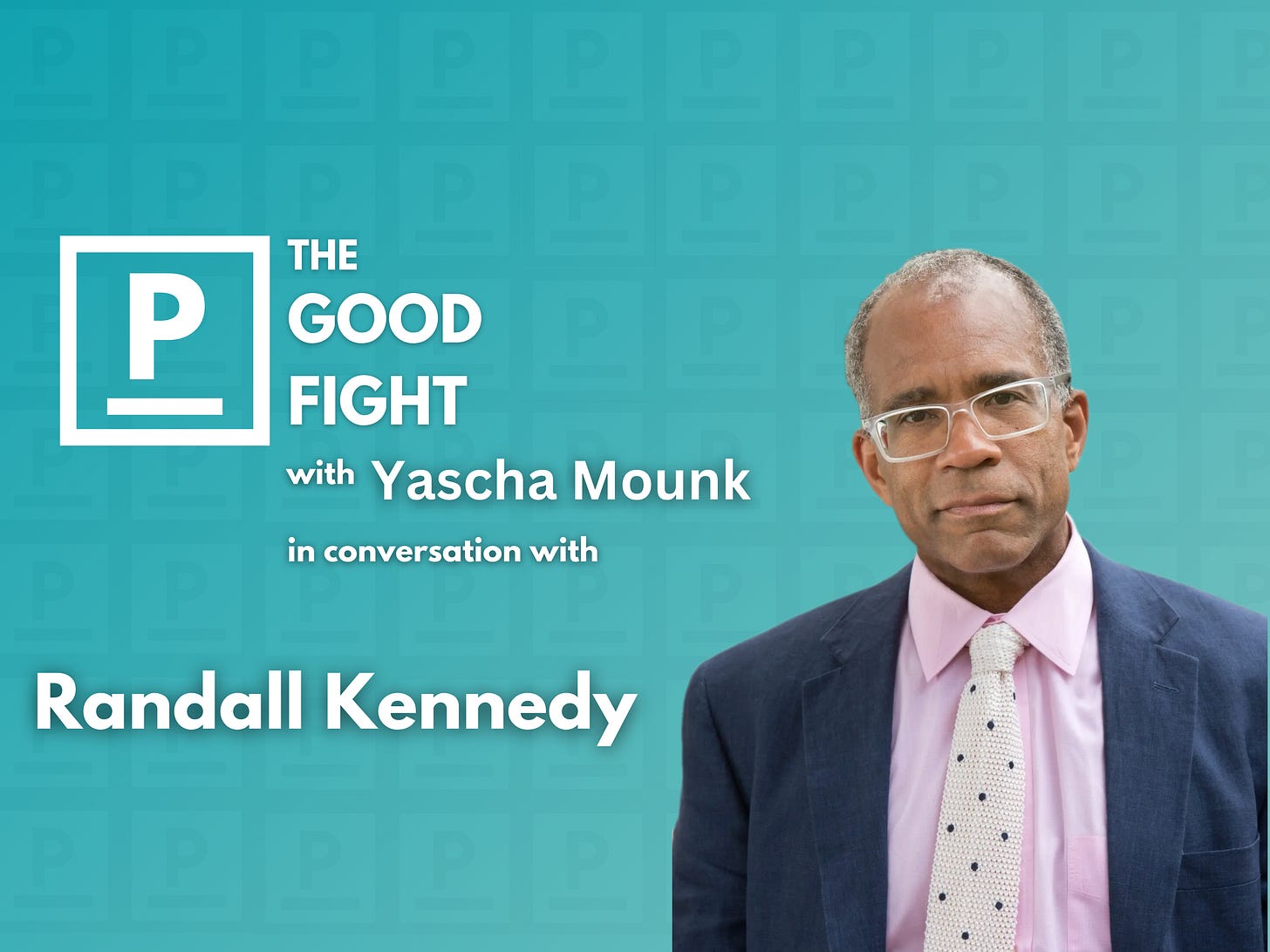Randall Kennedy is the Michael R. Klein Professor at Harvard Law School where he teaches courses on contracts, criminal law, and the regulation of race relations.
In this week’s conversation, Yascha Mounk and Randall Kennedy discuss the history of racism in the United States, the shortcomings of critical race theory, and whether we should be optimistic or pessimistic about the trajectory of racism in America.
This transcript has been condensed and lightly edited for clarity.
Yascha Mounk: I’m really excited for this conversation. I’ve been reading you for a long time. One of my frustrations in the intellectual debate over the last five or so years has been the rise to prominence of critical race theory and the attacks on it, which I think were often simplistic and caricatured.
Then there was the response on the left, which was that there’s really nothing to see here because all critical race theory means is thinking critically about the issue of race—and who wouldn’t want to do that?
The way I read your work—and tell me if I’m putting words in your mouth or mischaracterizing it—is as someone who certainly thinks critically about race in America and about the role it plays in the American legal system. It’s not the only thing you work on, but it has been one central theme of your scholarship. Yet, you have at times criticized critical race theory and would not consider yourself a critical race theorist. I think it would be very interesting for listeners to learn what that in-between space is.
Randall Kennedy: First of all, I do not want to join in any demonization of critical race theory. I know people who call themselves critical race theorists. I know them as colleagues, friends, and fellow scholars. I’ve learned from them, and I respect them. I do, however, have differences. I’d say the main difference is that I’m a liberal.
For instance, I embrace the anti-discrimination standard and believe in the establishment of that standard. What do I mean by “anti-discrimination standard?” I mean the presumption that taking race into account is a bad thing. Is it always bad? No. I distinguish between racial discrimination, which in some instances may be justifiable. I was, and remain, a defender of affirmative action—within limits. But generally speaking, I believe that taking race into account is a bad thing, has been a bad thing in American history, and remains a bad thing.
I believe that, as a presumptive matter, we ought not take race into account. We should take people as people, and that’s it. That’s one distinction, because critical race theorists, I think, view the anti-discrimination standard as insufficient. In my view, it’s not going to bring about radical change in American society or the fulfillment of all hopes for social justice. But it is an incursion on a particular aspect of American life—the racist use of the race line against racial minorities.
The anti-discrimination standard, which was at the heart of what occurred between 1950 and 1970 in the United States—the invalidation of de jure segregation, the attack on private racial discrimination best featured in the Civil Rights Act of 1964, the attack on racial disfranchisement best featured in the Voting Rights Act of 1965, and the Open Housing Act of 1968—in my view, those were great achievements that changed American life for the better.
Mounk: An implicit new emphasis in that is that, for many of the founders of critical race theory, those weren’t viewed as huge achievements. That’s not to say they were against them or thought the civil rights movement was bad, but they were certainly very critical of it. They didn’t believe that the basic liberal, philosophically liberal framework of the civil rights movement could make a very significant contribution to improving the condition of historically discriminated racial groups in the United States.
Kennedy: I think what you just said is correct. One difference between me and them is that they’re happy about those changes, but they basically view them as cosmetic. Some would say they’re rather minimal. You have this phrase that’s very widespread, “the new Jim Crow.” In my view, the great champions of the civil rights movement succeeded to a great extent in overcoming Jim Crow. But some critical race theorists would say that no, Jim Crow just changed his clothes. Jim Crow was not killed; we have Jim Crow in new guise.
I think that’s a mistake. You should recognize a victory, and a tremendous victory was won between 1950 and 1970. That doesn’t mean that all social injustice was overcome in America. It doesn’t even mean that racism was overcome in America—it was not. But in those years, a particular type of institutionalized racism was overcome.
The law played an essential part in that. The people who engineered that change in law—some of them were lawyers, like the great Thurgood Marshall, the preeminent example—and some of them were not lawyers. Some were protesters, the great racial dissidents of the period who petitioned, demonstrated, lobbied, and, in some cases, went to jail to trigger lawsuits. These people accomplished something in American life, and that should be recognized.
Mounk: It seems to me that this question about optimism versus pessimism—seeing the progress or focusing on the remaining injustices—is really key to people’s attitudes toward liberalism. That’s true for those who focus mostly on race, but it’s also true for whether people end up being liberal or non-liberal feminists, or whether they become liberal critics of colonialism or post-colonial scholars who reject liberalism.
There are really two elements to this. One is whether you can acknowledge that every society is going to have imperfections—that racism, sexism, and other genuine ills are always going to continue to exist in certain ways in human societies, given our fundamentally tribal and self-interested nature—and nevertheless recognize that our societies suffer from those ills significantly less than those in the past did.
The second is whether you think that the aspiration to live up to universal principles was a key force in bringing about some of those improvements, or whether, as many of the more critical perspectives would claim, it can’t be—that it’s merely the wool pulled over people’s eyes to blind them to the real interests of the powerful and privileged, which justify domination through empty references to universal principles.
Kennedy: I think the tragedy of our particular moment is that politics today—and here I’m mainly thinking of the second Trump administration—has given the pessimistic view a real boost.
Again, I want to emphasize that I’m not one to demonize the critical race theorists. My father, whom I venerate, was an early figure in critical race theory. He was completely pessimistic about American democracy. His view was, “This is a white man’s country. It was created as a white man’s country. It’s going to stay a white man’s country.” He was as critical and as pessimistic as Derrick Bell could have ever been—Derrick Bell being viewed as one of the progenitors of critical race theory and a friend and colleague of mine.
The camp of pessimism does have a very distinguished intellectual lineage. Alexis de Tocqueville, in Democracy in America, in his chapter “The Three Races of America,” was thoroughly pessimistic. Thomas Jefferson—thoroughly pessimistic. Abraham Lincoln—thoroughly pessimistic. In the Black nationalist tradition—Marcus Garvey, Malcolm X, Elijah Muhammad—thoroughly pessimistic.
Unfortunately, both historically and today, there are reasons they can point to that justify their pessimism. There is reason to think that we shall not overcome. You can’t say that’s a silly idea; it’s not. It has grounding. But on the other hand, there is also reason to think that we shall, that we can, overcome.
Thanks for reading! The best way to make sure that you don’t miss any of these conversations is to subscribe to The Good Fight on your favorite podcast app.
If you are already a paying subscriber to Persuasion or Yascha Mounk’s Substack, this will give you ad-free access to the full conversation, plus all full episodes and bonus episodes we have in the works! If you aren’t, you can set up the free, limited version of the feed—or, better still, support the podcast by becoming a subscriber today!
And if you are having a problem setting up the full podcast feed on a third-party app, please email our podcast team at leonora.barclay@persuasion.community
In the nineteenth century, the great spokesperson for that view was a man born into slavery—Frederick Douglass. Before the passage of the Thirteenth Amendment, Douglass was asked whether he foresaw a time when Black and white Americans could live together as equals and as neighbors, and he said, “yes, I can foresee that.”
In the twentieth century, the great spokesperson for this view was the wonderful Martin Luther King Jr. In the twenty-first century, the person most well known for expressing it is Barack Obama.
Again, I don’t want to make light of the depth and intensity of racism in American life—we are seeing it—but we also ought not underestimate the countercurrents. We have to take into account the abolitionist crusade, the Second Reconstruction. We have to ask ourselves: have things changed in America? Well, have they? Yes, things have changed in America. In my life, every day, I see change in America.
Mounk: I don’t know how deeply you got into this with your dad, but what would that argument look like? What is the argument you would make to him, given that he was born and raised in the segregated South?
Kennedy: My father was born in Louisiana. He had a very tough upbringing and saw racism at its ugliest, at its most violent. He never forgave the United States of America for its mistreatment of Black people. For him, the most gripping thing was the way the United States treated Black people who served in the armed forces.
They were sent straight back to segregation after they stopped serving. Not only were they sent back to segregation after they stopped serving, but while they were serving, they would see German and Italian prisoners of war go into restaurants that they themselves could not enter. This really scarred my father. It was a big thing with him.
We talked about this a good bit. I would say to him, “Dad, I understand, that was absolutely horrible. But let me ask you a couple of things. You’ve got three kids, right?” He would say, “Yeah, of course I’ve got three kids.” I would say, “How are they doing? All three of your children went to Princeton University.” “That’s right, three children.”
“I understand that what you saw in Louisiana was terrible. You married my mother, a wonderful woman. You met at Fort Jackson outside of Columbia, South Carolina. I understand that terrible things happened to you. But it’s also true that somehow you both got it together. You were refugees from the Jim Crow South. You went to Washington, D.C., built a household, raised three children who went to Princeton University. You have three children, all of whom became lawyers.”
“Doesn’t that suggest something about the society we live in that’s a problem for your theory? You are doing better than most of the people who tried to oppress you and keep you down.”
Mounk: There are a lot of people living in the most affluent suburbs of New York, Washington, D.C., and Los Angeles whose life’s dream would be to send three of their kids to Princeton University.
Kennedy: He did not live to see the inauguration of Barack Obama, but my father did live to see the inauguration of the first Black governor—probably the only one at that time—Douglas Wilder, when Wilder was elected in Virginia. I must say that even he was taken aback by it.
I am so sorry I never had the chance to talk with him about Obama. It is true that if my father were alive today, I think he would point to Trump and say, this is what I’ve been telling you.
He would say to me, Randy, you’re being sentimental by being so upset. This is America being America. That would be his view.
Mounk: When I think about this question, I feel very differently hearing about your father and hearing similar arguments from some of my more privileged friends, acquaintances, and colleagues. For someone with your father’s life story, I understand where that pessimism comes from. I disagree with it intellectually in various ways, but I certainly don’t feel that I have any right to sit in judgment of it.
When I hear faculty members at elite universities—people who grew up in those nice suburbs and who also went to Princeton or other prestigious institutions—say, America is just the same as it was fifty or a hundred years ago, I find that offensive to the life story of your father. It is offensive to the reality of how deep the injustices were that your father and many others in American history endured to say that today is just the same.
Kennedy: I would agree with all of that. I think ignorance has a lot to do with it. I talk with people all the time about these sorts of things. If somebody says to me, for instance, that there haven’t been many changes, I ask, what about the 1964 Civil Rights Act? They say, that didn’t matter much.” I say, listen, you’re talking to me. I was born in 1954. I clearly remember drives from Washington, D.C., to my birthplace, Columbia, South Carolina, before the 1964 Civil Rights Act. I remember them clearly. There was a noticeable difference between that drive in 1963 and that drive in, let’s say, 1966—not to mention today.
Unfortunately, people just don’t know. The irony is—and here I’ll go back to some of my critical race theory colleagues—I say, in a certain way, you are not taking into account enough how bad things were. If you don’t think that much has changed, then I think you don’t have a sufficient understanding of what Jim Crow was.
I’m not saying this to give any oxygen to complacency. I do want to state, however, that heroic, intelligent, persistent, collective action did make a difference. It has certainly made a difference in my life. It has certainly made a difference in the life that I can hand off to my children. Let’s be realistic.
I want to be a realist about everything. Let’s not just be realistic about the downsides—let’s be realistic about the upsides too. It’s a complicated story.
Mounk: You told me before we started the conversation that you’ve just submitted a manuscript on the civil rights era. Congratulations on that. I look forward to reading it when it comes out, I guess next year.
To what extent do you think that the frame of the civil rights era continues to be the thing that can allow us to make progress? Because this is, I think, ultimately what this debate is about. Philosophical liberals want to say, we have not yet fully lived up to some of those standards in various aspects of our society, but those are the right standards. We can use those standards as the lodestar to continue making progress. We’ve made significant progress so far, and there’s more to make, but we have the roadmap for how to do that.
The people who are much more pessimistic emphasize that we haven’t made any progress, but the reason they do that is to reach the conclusion that none of this is going to work. It’s a chimera. It’s an illusion to think that this framework can help point us toward further progress. That’s why, they argue, we have to rip it up and put something completely different in its place.
Kennedy: I would say that dissidents in American life have made a difference. One of the things we should be attentive to is that vehicles can only carry so much of a load. I am not saying that the ideas and doctrines so prominent between 1950 and 1970 were insufficient. They covered a lot of ground, but we face new ground today. With new ground come new ideas.
Some of the vehicles that were used then were wonderful, but we now have a very different America. Demographically, when I was coming up—I was born in 1954—it was, to a very large degree, a society of Black and white.
Mounk: You could put everything through that, and even when we measure segregation in American schools, we still, to a large extent, use metrics that made sense when there were two ethnic groups. Now that many schools have five, six, or even ten ethnic groups, those measures no longer make sense in capturing those changes—at least not at a purely empirical level anymore.
Kennedy: Absolutely. Things have changed to a very large extent, and along with change, we need to be experimental. For instance, is a race-based approach the best way to address a problem that may have a disproportionate adverse effect on Black people?
Let’s talk about schools. Some people say that schools today are as segregated as they were in 1954. No, they are not. In 1954, the year I was born, the state of South Carolina had, as part of its constitution, a requirement that Black children be separated from white children in schools. It was in the constitution, in the statute books, and enforced by a whole phalanx of people who put it into operation. They were not apologetic about it; that was the way it was. They believed they were defending the right moral order.
Because of the struggles of the civil rights era, that system was invalidated and put on the defensive. In the United States today, we have many problems. I am not saying we don’t. We have unfairness that is, frankly, scandalous. However, you will not have a public official stand up and publicly say, I’m in favor of separating people on a racial basis in public schools. You will not have it. That does not mean there is nothing to attend to, but we should be careful with our language. It is not true that there has been no change in segregation in public schooling.
As for affirmative action, I have defended it, and I still do. I am proud of having defended it. I think affirmative action did many good things. It had its weaknesses and its detriments. Now the courts have struck down affirmative action in higher education. Are there other ways to try to address ongoing difficulties and unfairness? Yes.
Even setting aside the Supreme Court for a moment, there were people suggesting experiments of other kinds. I think we should be open to those—for instance, people who talk about class rather than race.
Mounk: One of the strangenesses of the way affirmative action was practiced about ten years ago, connected to the demographic changes we were discussing earlier, is that it often was not benefiting the group for which it was originally designed. When affirmative action was first put in place, there were very few recent immigrants from African countries in the United States.
By the time the Supreme Court struck affirmative action down, according to various estimates, a third to a half of the Black students at Ivy League institutions such as Harvard were children of immigrants from Nigeria, Kenya, and other countries whose parents had come on H-1B visas. These were often tremendously deserving students who made significant contributions to their universities. However, they were often not poor students and did not tend to come from the most underserved neighborhoods, such as the South Side of Chicago or the poorer parts of Baltimore, which we might have hoped affirmative action would help lift up.
Kennedy: Yes, the affirmative action dispute was a complicated one. The fact of the matter is that the rationale the courts allowed for affirmative action was diversity. That was a pedagogical theory. The idea did not really have to do with repairing injustices of the past.
Mounk: It was a pretty patronizing idea because, to some extent, it implied that those Black students were there to enrich the educational experience of the majority of students, who would somehow learn better through diversity in the classroom. I have very mixed feelings about affirmative action. On the whole, I am in favor of burning the entire admissions system down in American universities. It is unjust and absurd across many dimensions, including the much-underdiscussed fact that virtually every elite school is now engaging in massive affirmative action in favor of boys, because otherwise they would have such an uneven gender ratio, which is also absurd.
By far the strongest normative defense of affirmative action is simply that African Americans have been excluded and maltreated in the most extreme ways for a very long time in American history. Therefore, at least on a temporary basis, creating opportunities for African Americans to be integrated into the elite institutions of this country and to gain those opportunities is an incredibly important way to address that history.
The problem from the beginning was that the Supreme Court did not allow for that rationale. Everyone was forced to pretend that they cared deeply about the, in this context, rather strange value of diversity, rather than the issue that this debate has always, at some level, truly been about.
Kennedy: That is a function of race talk in American life. In the United States, we have legal fictions, we have talk, and we have double talk. Societies are like that sometimes. Sometimes you have to approach things indirectly. Sometimes you use euphemisms. Sometimes you cannot say what ought to be said directly. That was true at the time of Brown v. Board of Education, and it is true in our time.
We had affirmative action, and everyone knew that the real impulse behind it was to try to repair deep-seated racial wrongs. The Supreme Court, however, would not allow that, so we came up with this cover story. Over time, my view of that story changed. I used to scoff at it entirely, but I stopped doing so. There was something to it. Still, I agree that the strongest impulse behind racial affirmative action in America was to repair past wrongs.
Are there other ways to accomplish the advancement of racial justice in American life? I think there are. In fact, I think there is a strong argument that people like me may have invested too much in affirmative action in higher education. Affirmative action is only an issue at the most elite schools. If you are a plausible candidate at those schools, it means you are already doing well. If you do not go to one, you will go to another good school.
What about the kids who graduate from high school—or the kids who do not graduate at all? What about the ones who graduate but are functionally illiterate? Why aren’t we focusing more on them? Why aren’t we focusing more on K–12 education, preparing people so that, frankly, they do not need any hand? It was a great thing to extend a hand to those who had been badly mistreated, but what about preparing people over time so they do not need it?
We need a more experimental approach. We should ask how to frame progressive, reformist action that creates a big tent—one that brings together coalitions rather than dividing people into small, competing groups. We should think in a broader, more inclusive way.
The great champions of the civil rights era—A. Philip Randolph, Bayard Rustin, Martin Luther King Jr., John Lewis—were great figures. Their greatness does not depend on whether we embrace the particulars of what they advanced. Their ideas and conduct were exemplary. The closing note in my book is that I do not know what will happen to the monuments they left behind. That was only seventy, eighty, ninety years ago. I cannot foresee the future. Maybe there will be a rollback, which would be terrible, but it could happen. What they created, though, was admirable and changed many lives for the better.
Even if their monuments are eroded, nothing can take away the way they acted—their generosity, their dignity. One of the great things about the period I wrote about, and one of the most inspiring things to study, is how these people, crushed into the dirt by the Jim Crow South, conducted themselves with such grandeur, generosity, and inspiration. They inspired people all around the world. We Shall Overcome is known everywhere. The women’s movement, the gay rights movement—every movement for social justice—has been inspired by what these people did. So I would say to everyone: read about them, listen to them carefully, and take the best of what they did. Embrace it, and put it to work in our time.
Mounk: I wholeheartedly agree with you on that. One of the things that sometimes depresses me about this political moment is that, faced with so much horribleness and indignity from this administration, not enough people are looking to the attitude embodied by the civil rights movement for guidance. What is encouraged and celebrated instead is someone like Gavin Newsom saying, I’m going to sink to the level of Donald Trump and mock him on social media with the same kinds of memes he uses to mock us, rather than emulating that incredible ability—when faced with physical intimidation, assault, and every dirty trick used by the political powers of the Southern states, and to some extent the federal government as well—to speak to the highest parts of our nature and conscience.
I came to the United States and started my PhD at Harvard in 2007. That was what was so inspiring about Barack Obama. That is one of the continuities between Obama and the civil rights movement. Even though the circumstances were far less difficult in his time, he tried to call upon the most magnanimous and noble parts of our nature, rather than saying, I’m going to fight dirt with dirt.
It would have been easy to understand in the 1950s and ‘60s why people might have said, we are faced with such violence and injustice; let’s fight back with violence of our own. It would have been perfectly understandable for people at that moment to resort to that strategy. The enduring importance of that political moment lies not only in the moral example of refusing to do that, but also in the fact that it showed such an approach can, under the right circumstances, be far more effective.
Kennedy: Tremendously effective. We paid lip service. I think that people know just enough to think that they know what happened during the civil rights era. I think people should take a second and a third look at what the people of Montgomery, Alabama, did in that glorious year when they basically created a government for themselves. Rosa Parks, E. D. Nixon, Martin Luther King Jr., Ralph Abernathy—absolutely extraordinary. Their lawyer, Fred Gray, too.
They had been marginalized and minimized. People did not think anything of them, and yet look at what they did. They surprised the world. Their example should be embraced, and I think it can lead to what we are going to need because, frankly, at the present moment, our country is in peril. Our democracy is absolutely in peril. To get out of this hole that we are in—this hole of polarization that is paralyzing our efforts to do almost anything—we are going to need inspiration from aspects of our traditions. The tradition that I have just finished writing about is one of the most important, one of the most revealing, and one of the most inspiring.
Mounk: I want to come back for a moment to how to make further progress and how to think about the role of race in the law in particular. There are two sets of views that seem relatively straightforward but are flawed for different reasons. One of them is the one that at least some materials of critical race theory embrace, which is to say that we should give up on the presumption that it is wrong for the law to discriminate on the basis of race and create a system in which how people are treated is often dependent, quite explicitly, on racial category.
The hope is that, unlike in the past, such a system would work to the benefit of those who have been most discriminated against and disadvantaged. One concern about this is normative. The other is empirical. If you have such a pessimistic interpretation of American history, why would you think that a system that explicitly discriminates on the basis of race is somehow going to favor the most disadvantaged rather than revert to what those kinds of systems looked like in the past?
On the other side, you have the stance of more conservative, philosophically-liberal jurists, including some Supreme Court justices, who say, the way to stop discriminating on the basis of race is to stop discriminating on the basis of race. In their view, race should not play a significant role in the law under any circumstances. Of course, we should have certain forms of anti-discrimination laws. We should stop businesses from excluding people on the basis of race. We should have legislation ensuring that if an employer suddenly fires ten Black employees and no white employees, there can be an anti-discrimination lawsuit that provides a remedy if it is obvious they were fired on racial grounds.
But, for example, we would not have affirmative action. We would not have set-asides in federal contracting. We would not have districts drawn to ensure majority-Black representation. Those two positions each seem straightforward and coherent in their own ways. Yet it seems that you, on a number of these issues, are arguing for something not exactly in the middle but suggesting that, on the whole, we do not want race to be at the center of the law. We should have a presumption against it. But there are more areas than conservative, philosophically-liberal jurists would acknowledge in which race does need to play a role. What does that look like, and what is the logic for that middle position?
Kennedy: A couple of things. You mentioned two, and I want to add a third, but let me walk through your first two.
First, I share your resistance to a legal regime that would normalize and reinforce racial distinctions throughout social life. For one thing, things change. One of the main requirements for that kind of regime is clear distinctions. Who is white? That question, and others like it, are becoming more and more complicated.
Mounk: Incidentally, I am a political scientist by training. When you look at people who defended forms of consociational democracy in countries like Lebanon—where, very explicitly, which office you can be elected to, what kinds of laws about education, marriage, and divorce you are subject to, and so on, depend on your status as a Sunni, Shia, or Maronite Christian—the people who came up with those schemes, like Arend Lijphart, explicitly said that we have to make sure there is not too much contact and mixing between those different population groups, because otherwise the scheme will fall apart.
The very logic of that system, from the beginning, recognized that for its maintenance you need relatively ironclad categories. One of the wonderful things about American life is that some of those categories have started to blend and mix in all kinds of ways over the course of the last fifty years.
Kennedy: I don’t want a system in which I have to fill out a form asking, who was your great-grandmother? Where did she come from? Was she born in the United States, or was she born in Jamaica, or in Africa? I prefer the fluid, the integrationist, the amalgamationist mix. So that’s number one.
Number two, you mentioned Chief Justice Roberts and his view that the way to get rid of discrimination is to stop discriminating. I have considerable sympathy for that position. The problem I have with Chief Justice Roberts, or at least one problem—probably my main one—is this: I hear that claim, but why is it that he and others get so passionate in the face of affirmative action or electoral arrangements that advantage people of color, yet I don’t see the same passion about the age-old policies and habits that disadvantage people of color?
Take other forms of gerrymandering, for instance. Listening to our present administration on anti-discrimination law, if you just arrived here and didn’t know any better, you would think it was mainly white people, white men, who were being discriminated against in the United States. It is still the case today that there is a tremendous amount of racial discrimination, but I don’t hear that from the people who embrace Chief Justice Roberts’s position.
To tell you the truth, if I thought that the people who say “race is out” were applying that belief comprehensively, passionately, and consistently, I might take a different view. I might not ultimately agree with them, but I could say, let’s have ten years of that and see what happens.
There is a third thing, a looming ghost in the room, that you did not mention but that is on my mind. That third thing is the old-time religion of racism in America. It is still the case that there are people who believe in racial hierarchy. The way they cover it is by saying, race blind—we don’t want to take race into account, while in fact they are taking race into account.
In the rest of this conversation, Yascha and Randall discuss anti-discrimination laws and mistrust in the U.S. political system. This part of the conversation is reserved for paying subscribers…













